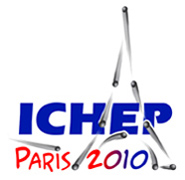Speaker
Ms
Regina Kwee (for the ATLAS Collaboration)
(CERN/Humboldt University of Berlin)
Description
Since the restart of the LHC in November 2009, ATLAS has collected inelastic pp-collisions to perform first measurements on charged particle densities. These measurements will help to constrain various models describing phenomenologically soft parton interactions. Understanding the trigger efficiencies for different event types are therefore crucial to minimize any possible bias in the event selection. ATLAS uses two main minimum bias triggers, featuring complementary detector components and trigger levels. While a hardware based first trigger level situated in the forward regions with 2.2 < |eta| < 3.8 has been proven to select pp-collisions very efficiently, the Inner Detector based minimum bias trigger uses a random seed on filled bunches and central tracking detectors for the event selection. Both triggers were essential for the analysis of kinematic spectra of charged particles. Their performance and trigger efficiency measurements as well as studies on possible bias sources will be presented. We also highlight the advantage of these triggers for particle correlation analyses.
Author
Ms
Regina Kwee (for the ATLAS Collaboration)
(CERN/Humboldt University of Berlin)
